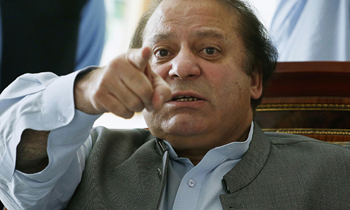Islamabad, Oct 7: Facing international isolation, Prime Minister Nawaz Sharif in an unprecedented move has warned the powerful military not to shield banned militant groups and directed authorities to conclude the Pathankot terror attack probe and the 2008 Mumbai attack trial, a leading Pakistani daily reported Thursday. Sharif's orders came after a series of meetings between military and civilian leaders, Dawn newspaper said. The government delivered a “blunt, orchestrated and unprecedented warning” to the military leadership and sought consensus on several key actions, including action against banned militant groups, the paper quoted unnamed individuals, who were involved in the meetings.
 However, the Spokesman of Pakistan Prime Minister's Office strongly rejected the Dawn report. “The Spokesman has termed the contents of the story not only speculative but misleading and factually incorrect. It is an amalgamation of fiction and half truths which too are invariably reported out of context,” an official statement said.
However, the Spokesman of Pakistan Prime Minister's Office strongly rejected the Dawn report. “The Spokesman has termed the contents of the story not only speculative but misleading and factually incorrect. It is an amalgamation of fiction and half truths which too are invariably reported out of context,” an official statement said.
“The fact that the report itself states that none of the attributed statements were confirmed by the individuals mentioned in the story, clearly makes it an example of irresponsible reporting,” it said. The PMO Spokesman said, “It is imperative that those demanding the right to information at par with the international best practices, also act in a manner which is at par with international reporting norms and standards.”
The Pakistan Foreign Office termed the report as “speculative”. Asked about the report, Pakistan Foreign Office Spokesman Nafees Zakaria also said, “The story you are referring to is purely speculative and as the author himself acknowledged that ‘none of the attributed statements were confirmed by the individuals mentioned'.”
“Such speculative stories on matters of national security are not helpful for national causes,” he said. According to the paper, at least two sets of actions have been agreed as a result of the most recent meeting, an undisclosed one on the day of the All Parties' Conference, which took place on Monday.
ISI Director General Rizwan Akhtar, accompanied by National Security Adviser Nasser Janjua, will travel to all provinces with a message that military-led intelligence agencies should not interfere if law enforcement agencies act against militant groups that are banned.
Sharif directed that fresh attempts be made to conclude the Pathankot investigation and restart the stalled Mumbai attack trial in a Rawalpindi anti-terrorism court. Those decisions, taken after an extraordinary verbal confrontation between Punjab Chief Minister Shahbaz Sharif and the ISI DG, appear to indicate a high-stakes new approach by the PML-N government, the paper said.
Separately, on Monday Foreign Secretary Aizaz Chaudhry made a presentation in the Prime Minister's Office to a small group of civil and military officials. The presentation by the Foreign Secretary summarised the results of the recent diplomatic outreach by Pakistan, the crux being that Pakistan faces diplomatic isolation and that the government's talking points have been met with indifference in major world capitals, the paper said.
On the US, Chaudhry said that relations have deteriorated and will likely further deteriorate because of the American demand that action be taken against the Haqqani network. On India, Chaudhry said that the completion of the Pathankot investigation and some visible action against Jaish-i-Mohammad (JeM), which India says was behind the January 2 attack, were the principal demands.
Chaudhry said while China has reiterated its support for Pakistan, it too has indicated a preference for a change in course by Pakistan. Specifically, while Chinese authorities have conveyed their willingness to keep putting on technical hold a UN ban on JeM leader Masood Azhar, they have questioned the logic of doing so repeatedly, the report said.





Comments
Add new comment